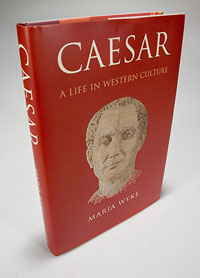Beware the Ides, beware the Eagles
As an expression, the “Ides of March” entered our vernacular right around the rise of the modern. In ancient Roman daily life, the ides approximated mid-month—in particular, the ides of March heralded a feast day for Mars, god of war, often accompanied by a military parade. We associate it with the death of Julius Caesar, and with Shakespeare’s soothsayer, who intones near the opening of that eponymous play (Act I, Scene II): “Beware the ides of March.” Caesar, the Shakespearean character, of course dismisses the speculative fervor with a certain ease:
“He is a dreamer; let us leave him.”
We know how that story ends. The dream-life was a bit more Technicolored for medieval poets and bards, who took on the classical story of Caesar-the-superhuman’s death, and imbued it with portends better suited to middle times: Caesar’s horses stopped grazing and wept openly; a bull he recently sacrificed had no heart; a bird was torn asunder by birds of the same feather, while the Senate watched with eyes aghast; and flames lit forth from the palms of otherwise unharmed men. Soon, in epic poems, Caesar would mate with Morgan le Fay and produce the fairy king Oberon, while Chaucer would chronicle the events of of the Ides (in the company of great tragic death!) in “The Monk’s Tale.” Here, a shift of fortune: Caesar is a victim of the fates, which was a prequel to his modern characterization as an anti-hero. Here, our embrace of Byronic self-destruction was effused with a burgeoning taste for the evils of empire; but what man was worshiped more than Caesar? Pride doth come before the fall.
Enter Maria Wyke’s Caesar: A Life in Western Culture, which produces a Caesar for our own times: lustful, contested, and complicated; (im)postured by everyone from Tacitus to Mussolini to the directors of HBO’s Rome; a cipher as ever-changing as the times. For the Ides, which we’re doing our best to beware, consider this excerpt from Wyke’s book that locates Caesar’s legacy midway between fable and fame.
“Been down the road to Damascus/The road to Mandalay./Met the ghost of Caesar on the Appian Way./He said, “It’s hard to stop this binging, once you get a taste./But the road to empire is a bloody stupid waste.”
There are worse things in life than to be quoted by the Eagles (?). One of these things might be NPR reducing the doyenne of modernism to her “Julius Caesar-style” haircut, but in 1934, while on a lecture tour of the United States, Gertrude Stein captioned a recent bob with that same hyphenated description (as did Catherine R. Stimpson in the excellent short essay “The Somagrams of Gertrude Stein”).


